
The UAE is set to host the COP28 summit later this month with countries from around the world gathering to deliberate the impact of climate change on economies, lives and even entire continents. Two years ago, the UAE announced ambitions to reach net zero emissions by 2050. Its neighbouring country of Saudi Arabia has set itself a target to achieve that same goal by 2060 and earmarked investments to the tune of a staggering US$180 billion to get there. All the facets of business travel – from airlines and hospitality to destinations themselves – will necessarily play their part in helping the region to reduce its overall carbon emissions. Here’s how they intend to do so.
Aviation
According to the International Energy Agency, last year, aviation accounted for 2 per cent of worldwide CO2 emissions. The need for the sector to rapidly decarbonise cannot be understated. Fortunately, this region, including its airlines and airports, are going all in. Emirates is one of the world’s largest airlines with a fleet of around 260 aircraft comprising A380s and Boeing 777s. In May, it announced a US$200 million sustainability fund to finance research and development projects that are specifically aimed at reducing the impact of fossil fuels in commercial aviation. “Our US$200 million fund is earmarked for R&D, and not for operating costs like the purchase of sustainable aviation fuel (SAF) or carbon offsets to tick regulatory boxes – activities we consider business-as-usual,” said Sir Tim Clark, president of Emirates Airline, at the time of the announcement.
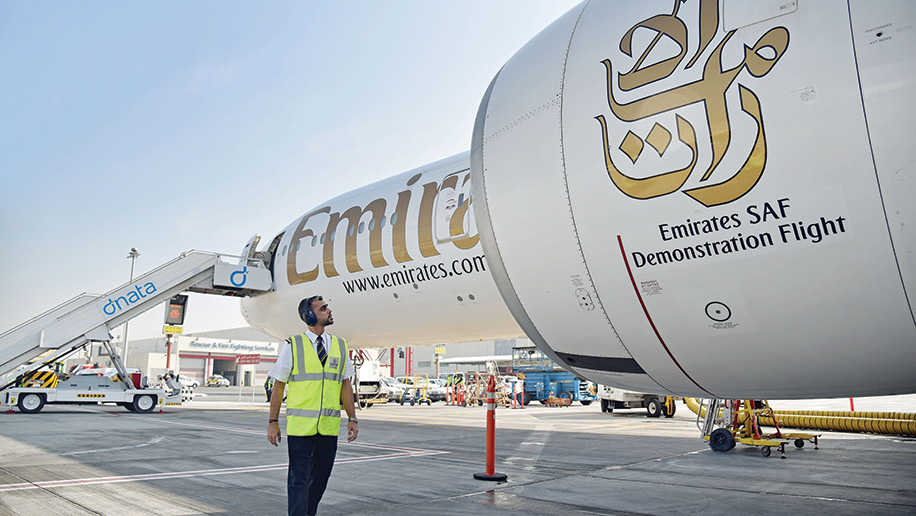
On the SAF front, Emirates also recently signed an agreement with Shell Aviation for the supply of over 300,000 gallons of blended SAF at its hub of Dubai International airport (DXB). The airline added that it would track the SAF’s use data through the blockchain-powered Avelia platform. It follows months after Emirates completed its first test flight with 100 per cent SAF in one engine this January.
Emirates went beyond Dubai last month to expand a partnership with Neste for the supply of more than three million gallons of blended Neste MY Sustainable Aviation Fuel. The fuel will be supplied over 2024 and 2025 for the carrier’s flights departing from Singapore Changi and Amsterdam Schiphol airports.
However, the supply of SAF remains a major concern as it is currently produced in minuscule quantities. The oneworld Alliance, for example, whose members include Qatar Airways and Oman Air among others, has set a target to ensure that 10 per cent of the alliance’s combined fuel use is SAF by 2030. According to the International Air Transport Association (IATA), in 2022, SAF production reached 300 million litres, which although a 200 per cent year-on-year increase still constituted only 0.1 per cent of aviation’s total kerosene consumption last year, thereby highlighting the chasm that exists between demand and supply of the product.
Emirates’ fellow UAE carrier, Etihad Airways, has had its Greenliner programme in place since 2019 to test advanced technologies related to making aviation more sustainable. In a bid to drive up production of SAF, Etihad signed an agreement in January with Masdar, ADNOC, BP and Tadweer to jointly undertake feasibility studies on the production of SAF in the UAE using municipal solid waste and renewable hydrogen.
In some cases, the airlines have gone beyond SAF to explore other areas where it could become more sustainable. Last year, Emirates’ flight catering division opened the world’s largest vertical farm near Al Maktoum International airport at Dubai World Central. The 330,000 sqft facility has been built to produce more than one million kilogrammes of vegetables annually, while requiring 95 per cent less water compared to conventional agriculture and saving more than 250 million litres of water each year.
Apart from airlines, airports too are chipping in with major initiatives to go green. Last year, DXB kicked off a fresh waste management programme to help divert 60 per cent of all waste from the airport away from landfills. Annually, it aims to capture and compost more than 2,000 tonnes of food waste, while pointing out that decomposing food waste left in landfills releases methane gas which is 72 times more harmful than CO2 to the environment.
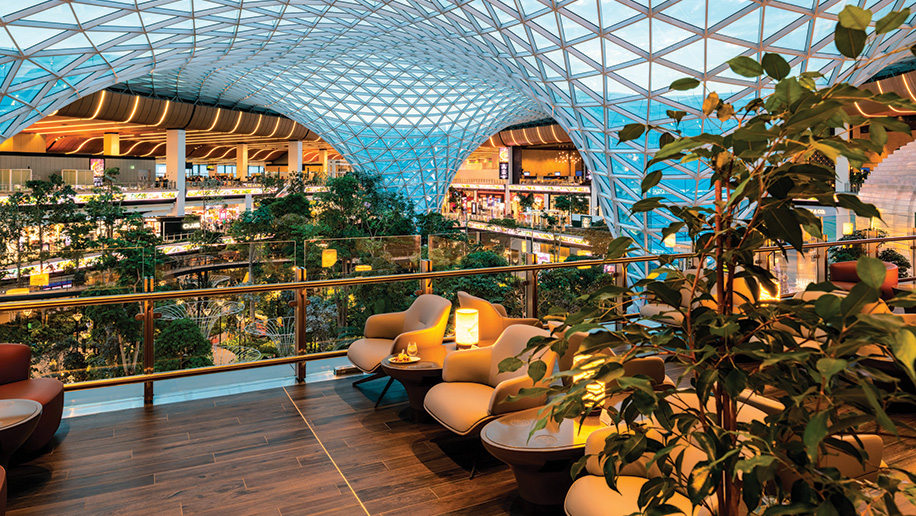
Doha’s Hamad International airport (HIA) completed its first phase of a major revamp project last year, and one of the star attractions it unveiled at the terminal was the Orchard – an indoor tropical garden that includes more than 300 trees and 25,000 plants obtained from sustainable forests globally. HIA noted that 40 per cent of the waste generated at the airport in the fiscal year of 2022–2023 was reused or recycled, including a staggering 736 tonnes of plastic waste. It added that 100 per cent of the wastewater generated at the airport was subsequently reused for landscape irrigation, with zero wastewater discharged to the sea.
Over in Saudi Arabia, the new Red Sea International (RSI) airport recently welcomed its first scheduled passenger flight. That airport, when fully operational, is expected to be carbon neutral as well as powered 100 per cent by renewable energy. It is being designed keeping in mind a future where electric or carbon-minimal aircraft become the norm, rather than the exception. RSI is being prepared to eventually service hydrogen-powered seaplane variants as well as electric vertical takeoff and landing (eVTOL) aircraft. Last year, hydrogen-electric aircraft developer Zeroavia signed an MoU to partner with Red Sea Global to research the possibility of fitting Cessna Caravan seaplanes with hydrogen-electric propulsion technology.
Hospitality
The Sustainability Hospitality Alliance which counts the likes of Accor, Four Seasons, Jumeirah, Marriott, Wyndham and Radisson, among several others, as its members, has said that its research indicates that the hotel industry would need to decrease its carbon emissions by 66 per cent per room by 2030 – and by 90 per cent per room by 2050 – to ensure that the growth forecast for the industry does not lead to an inevitable corresponding increase in carbon emissions too.
Dubai grew its number of international overnight visitors in 2022 to 14.36 million, a 97 per cent increase year-on-year. Its hotel inventory at the end of December 2022 stood at 146,496 rooms at 804 hotel establishments, compared to 126,120 rooms and 751 establishments at the close of December 2019. Factoring in the current growth rate, Dubai’s Department of Economy and Tourism (DET) relaunched its Carbon Calculator tool earlier this year for the hospitality industry in the emirate to measure and track its emissions. Every month, hotels are mandated to report their consumption along nine key carbon emission sources: water, electricity, liquefied petroleum gas, district cooling, landfill waste, petrol, diesel, recycled waste and refrigerants.

Major hospitality brands are taking their own unique routes towards the goal of reducing their carbon footprint. “We are the first major hotel company to establish science-based targets to reduce greenhouse gas emissions in line with the Paris Agreement. We are also taking steps toward reducing our environmental footprint through our ‘Watts, Water and Waste’ programmes – and we aim to cut emissions intensity by 75 per cent in our managed portfolio by 2030, helping us drive toward a net zero future,” says Emma Banks, vice president for F&B Strategy and Development for the EMEA at Hilton.
Here in the region, Hilton has undertaken several initiatives to reduce overall carbon emissions with much of its focus driven towards its F&B sector. “Food waste reduction is a key priority. This year, we collaborated with the United Nations Environment Program West Asia and Winnow to launch ‘Green Ramadan’ – a pioneering campaign at three hotels which resulted in a 61 per cent reduction in food waste. Each of the hotels aimed to close the loop across the food value chain by focusing on composting, local sourcing, sustainable gastronomy, and food donations,” notes Banks. Hilton has also launched a ‘Green Breakfast’ initiative to reduce food waste across breakfast operations in 13 UAE-based hotels with the data gathered between August and November this year serving as a baseline for its future roadmap.
Banks says that the group’s Conrad Abu Dhabi Etihad Towers property installed a vertical hydroponic farm this year too whereby the hotel’s Michelin-recognised restaurant Li Beirut uses produce from that farm.
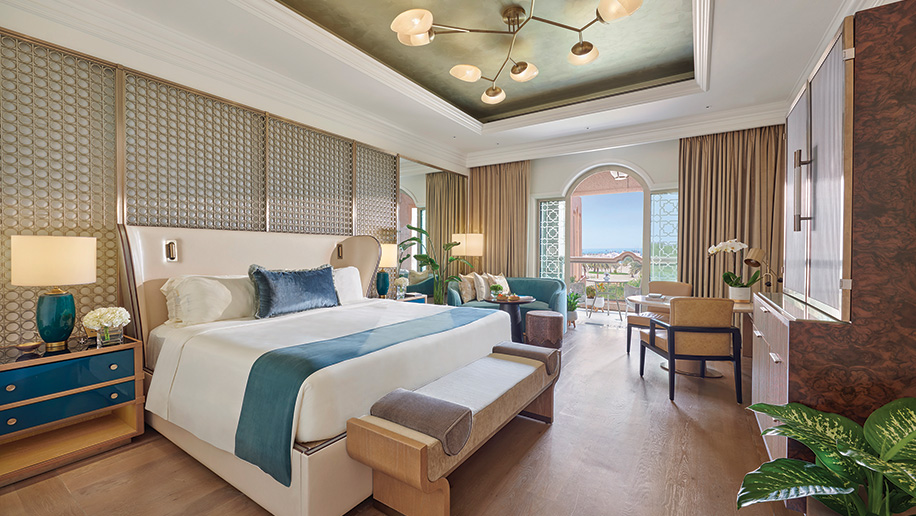
Having an on-site farm significantly helps to reduce emissions related to the transport of produce. “We recognise the importance of local sourcing, and earlier this year renewed our partnership with UAE-based agritech platform Fresh on Table. Through this partnership, we expect to source more than 700 tonnes of local produce annually. This extended partnership will result in a saving of over 175 million food miles, with local produce comprising more than 30 per cent of the total basket for our UAE-based hotels,” says Banks.
The UAE-headquartered Jumeirah Group also realised the significance of local sourcing. It said that it saved 20,842,910 food miles by switching to locally sourced produce. Its Jumeirah Zabeel Saray property in Dubai operates Arcadia, a venue that integrates an onsite urban hydroponic farm with a unique dining concept. Jumeirah says that the hydroponic farm reduces water consumption by up to 70 per cent for each yield compared to conventional techniques as no soil is required for farming. The farm, spread across 55 sqm, can harvest up to 250kg of more than 30 varieties of leafy greens and herbs per month, and guests at Arcadia can have its produce served straight to them at their table located within the farm’s premises. Guests visiting any of the resort’s signature restaurants can also receive fresh produce from that farm.
Jumeirah has also pushed forward with on-site filtration and water bottling plants for several of its properties. It says that it has by way of this initiative already removed more than nine million single-use plastic bottles from reaching landfills or the ocean as a result of switching to reusable glass bottles instead.
Other hospitality groups such as Marriott, have gone ahead and implemented class-leading technology to get innovative with its sustainability initiatives. The Delta Hotels by Marriott, Dubai Investment Park property, for example, collaborated with AirOWater to transform humidity in the air into drinking water for hotel guests by way of AirOWater’s Atmospheric Water Generators (AWG).
“In September 2021, Marriott International announced that it was committed to a net zero future, reducing all our carbon emissions across every element of our operation by no later than 2050,” says Sandeep Walia, chief operating officer for the Middle East at Marriott International. “Across our 8,000-plus properties, we aim to reduce water intensity by 15 per cent, carbon intensity by 30 per cent, waste to landfill by 45 per cent, food waste by 50 per cent, achieve a minimum of 30 per cent renewable electricity use, responsibly source 95 per cent of our food (in our top 10 categories) and locally source 50 per cent of all produce by spend.
“Our 2023 Marriott Bonvoy Travel Trends Research study for the UAE and Saudi Arabia indicated that sustainability is now a key factor when it comes to travel plans, with 85 per cent in the UAE and 80 per cent in Saudi Arabia saying environmental considerations now have some impact on their arrangements. Forty-three per cent of those in the UAE said environmental considerations define their travel plans and they will only spend money with companies that have a positive environmental impact, whilst the figure is 38 per cent in Saudi.”
Outside of the UAE, Marriott has implemented initiatives such as installing solar power panels at its Riyadh Marriott Hotel. Marriott and Sheraton hotels in Jordan are completely powered by solar energy plants resulting in a total C02 of only 4,000kg. Thermal solar panels were installed too in Dead Sea Marriott in 2007 and Amman Marriott in 2014. The total annual reduction in CO2 emissions as a result of it, says Marriott, is 3,939,778kg. The Westin and Le Meridien City Centre Bahrain meanwhile completed the installation of wind turbines in 2022, making them the first two hotels in Bahrain to do so. In Saudi Arabia, The St. Regis Red Sea Resort, which will open imminently, will have its guests transported by hydrogen-powered seaplanes and Lucid electric cars.
Introducing fresh twists on overall sustainability, Mandarin Oriental introduced vegan rooms earlier this year at its property in Abu Dhabi while Minor Hotels more recently unveiled its own vegan-inspired rooms at NH Collection Dubai The Palm.
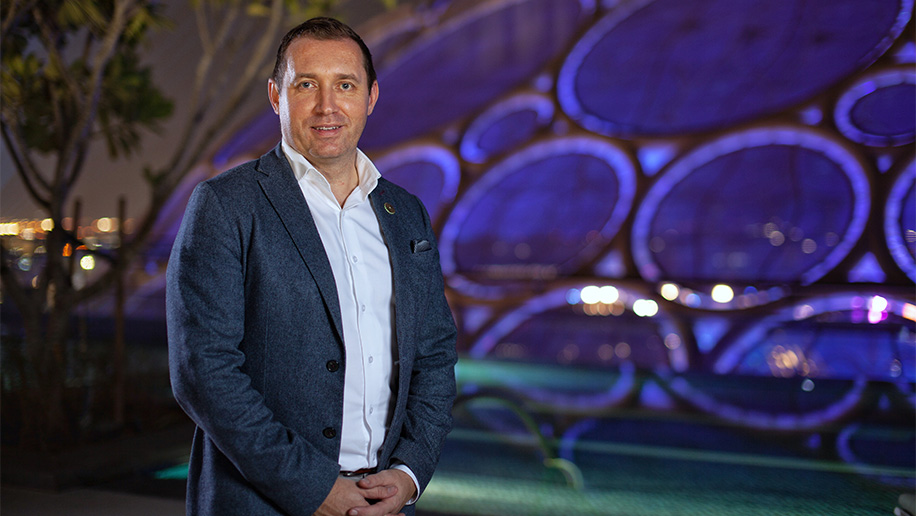
Rove Hotels, meanwhile, whose Rove Expo 2020 property will be the only hotel inside the COP28 Blue Zone, has pledged to plant a tree for every room booked during the COP28 period across all its hotels, with a goal of planting at least 28,000 trees by the end of the year. All Rove hotels have received the Green Key certification, and Rove recently joined the Sustainable Hospitality Alliance. Paul Bridger, the chief operational officer for Rove Hotels, acknowledges the challenges of going green, but defines the benefits too. “Adopting and implementing sustainability standards in the hospitality sector can be challenging due to high upfront costs, lack of awareness, and operational complexities. It’s important for businesses to understand that sustainability can lead to long-term cost savings and operational efficiencies, which can offset the initial investment and ensure a win-win situation for companies, consumers and the environment,” says Bridger.
Destinations
Entire cities and tourism destinations are moving towards a sustainable future. The Dubai 2040 Urban Masterplan, for example, aims to double the recreational and green spaces in the emirate, ensure that rural natural areas and natural reserves comprise 60 per cent of the emirate’s total area, and create green corridors linking workplaces, residential and other zones.
In Doha, Msheireb Downtown Doha, the flagship project of Msheireb Properties, is being touted as “the world’s first sustainable downtown regeneration” project. “The whole concept and vision of Msheireb Downtown Doha relies on protecting and enhancing our environment, consuming fewer resources, generating less waste, and reducing our carbon footprint,” says Ali Al Kuwari, CEO of Msheireb Properties.
Al Kuwari points out that the use of technological innovations such as passive cooling, energy and water conservation, renewable energy, and a reduction of carbon emissions has made this city district certifiably sustainable. He goes on to note that even the placement of buildings is such that they shade one another and are painted in light colours to reduce overall cooling requirements. “On the outside, we have 6,400 rooftop solar panels to provide on-site energy generation and 1,400 solar panels to secure hot water, which generate around 25 per cent of power for many buildings,” he says. “Throughout Msheireb Downtown Doha, we demonstrate how you can build both in one space – the world’s largest certified sustainable community and a place where citizens want to live, work, and play.”
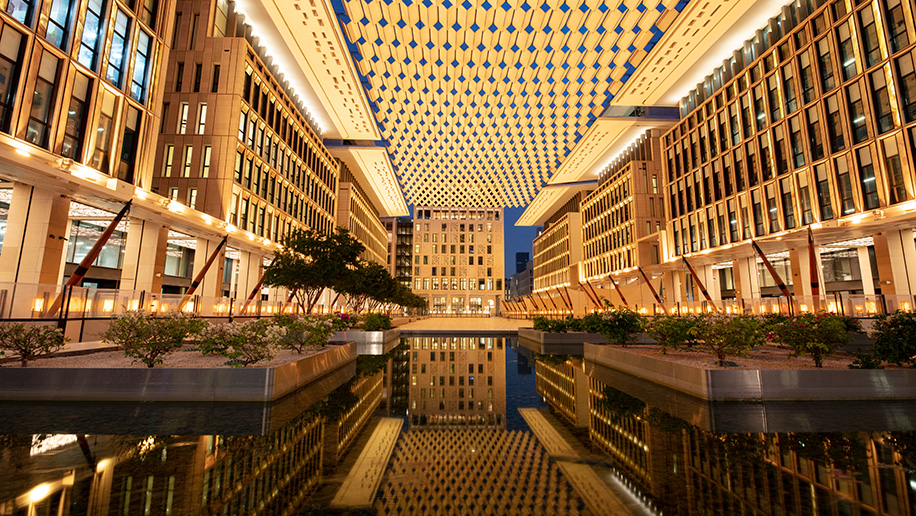
Rather than retrofitting destinations with sustainability initiatives years after it has developed, some destinations are being conceptualised with sustainability features from the very beginning. Two destinations that are going flat out to cement their sustainability credentials are The Red Sea and Amaala, both currently being developed by Red Sea Global, in Saudi Arabia. The two projects are built on the concept of regenerative tourism – tourism that doesn’t just ensure that existing sustainability benchmarks for a region are preserved, but instead aims for the enhancement of a destination’s sustainability outlook with the baseline being the condition it was in before development began within it. The Red Sea and Amaala are therefore aiming to achieve a 30 per cent net conservation benefit by 2040. Both destinations will be powered by 100 per cent renewable energy throughout the day, every day of the year. It has already installed more than 760,000 photovoltaic panels to power the first phase of The Red Sea. It is also implementing the world’s largest battery storage facility with a capacity of 1,200 megawatts per hour to help it achieve complete grid independence.
Elsewhere in Saudi Arabia, the US$63.2 billion Diriyah project in Riyadh is being constructed with the Najdi architecture style that relies on the use of mud bricks. A few weeks ago, the first phase of its masterplan was awarded Platinum Level LEED for Cities Certification by the US Green Building Council. The accreditation in LEED for Cities and Communities is the first time a project within the Middle East has received the accolade.
While projects such as Red Sea Global and Diriyah are backed by the government, the private sector too is stepping up within the region with its green initiatives. Luxury chauffeur-hailing service Blacklane launched an all-electric fleet, including Mercedes EQS vehicles, in Dubai earlier this year. Its most recent round of funding saw it raise €34 million to further expand its fleet in the more than 50 countries in which it operates, including the UAE. “Our UAE operations have experienced a tenfold growth in just 12 months, establishing an impressive industry standard. We successfully launched our inaugural fleet of all-electric vehicles in Dubai earlier this year, contributing to the Year of Sustainability in the UAE,” says Nicolas Soucaille, general manager of Blacklane Middle East. “While the UAE’s regulatory framework has been pivotal in advancing our green initiatives, this sustainability drive extends to all of Blacklane’s operational regions. As a result, our strategy not only enhances the passenger experience but also reduces carbon emissions on a global scale.”
Driving a green agenda has inherent limitations, not least for Blackane whose electric fleet has a limited range before it needs to be recharged. “It is true that operating an all-electric fleet does traditionally raise concerns about potential limitations on the number of rides each car can provide in a day. However, we’ve effectively addressed this challenge by implementing our in-house supercharging network. Each vehicle typically requires between 25 to 40 minutes with our superchargers twice a day, which means that the electric factor doesn’t impact the revenue generated from each vehicle. Our all-electric UAE fleet can operate on a robust revenue model,” says Soucaille.
Collectively, aviation, hospitality and destinations themselves are increasingly innovating to make the future of business travel far more sustainable than it is today.











